INFLUENCE OF MINERAL AND MICROBIOLOGICAL FERTILIZER ON THE CONTENT OF NITROGEN, PHOSPHORUS AND POTASSIUM IN WINTER WHEAT PLANTS UNDER CONDITIONS OF THE ADRID ZONE
Main Article Content
Abstract
The results of a study of the influence of mineral and microbiological fertilizer on the content of nitrogen, phosphorus and potassium in winter wheat plants are presented. Active introduction of microbiological agents into modern agricultural production is one of the best strategies for the development of sustainable agriculture. The introduction of microbiological solutions, due to their sustainable and environmentally friendly mechanisms for regulating plant growth, is becoming increasingly widespread in global agriculture. A special role in this process is played by soil bacteria that stimulate plant growth. Tests were carried out from 2020 to 2022 in the conditions of “K(F)H Bryzgalin Yu.A.” Stepnovsky municipal district of the arid zone of the Stavropol Territory. The object of the study is winter wheat variety Ksenia. The subject of the study is doses of mineral fertilizers and microbiological fertilizers. The experience is two-factor. Factor A - mineral fertilizers, factor B - microbiological fertilizers. The repetition is threefold, the placement of options is randomized. The average nitrogen content in the variants without the use of mineral fertilizer was 3.52%. The nitrogen content in winter wheat plants in the variants with pre-sowing application (N8P36) averaged 3.57%. The difference between these options was 0.05%. Treatment of winter wheat seeds with the microbiological preparation Sporex 1l/t ensured an increase in phosphorus content in plants by an average of 0.05% and amounted to 0.65%. Treatment of seeds with microbiological fertilizers Sporion 1l/t contributed to an increase in the potassium content in winter wheat plants, by an average of 0.08% to 1.59%, compared to options without the use of biological products. The addition of ammophos (N8P36) during sowing helped to increase the yield level of winter wheat to 3.03 t/ha, or by 0.55 t/ha compared to the control. The average yield of winter wheat was noted on the variant (N8P36) + Sporion 1 l/t over the years of research and was 3.15 t/ha. This indicator is higher than the control option by 0.67 t/ha and 0.12 t/ha than the option (N8P36) without microbiological fertilizer.
Article Details
References
2. Meena, S. K. Importance of soil microbes in nutrient use efficiency and sustainable food production / S. K. Meena, V. S. Meena // Agriculturally Important Microbes for Sustainable Agriculture. – Vol. 2. – 2017. – P. 3-23.
3. Bevololova, A. A. Growth regulators in subsequent processes of monitoring winter wheat seeds / A. A. Bevololova, N. V. Gromova // In the collection: Current issues of ecology and environmental management Collection of scientific papers based on materials of the VI international scientific and practical conferences. – Stavropol, 2018. pp. 37-41.
4. Boyko, V.V. Agrochemical assessment of microbiological fertilizers based on consortia of PGPR bacteria in winter wheat crops in the arid zone of the Stavropol Territory / V.V. Boyko, N.V. Gromova, A.A. Bevololova // Current state and prospects for the development of horticulture, viticulture and nursery farming in the Russian Federation: a collection of works based on the materials of the International Scientific and Practical Conference dedicated to the 100th anniversary of the birth of Professor, Doctor of Agricultural Sciences N. M. Kurennoy, Stavropol, January 01 – 31, 2023 / Federal State Budgetary Educational Institution VO Stavropol State Agrarian University. – Stavropol: Publishing house "AGRUS" of Stavropol State Agrarian University, 2023. – pp. 21-28. – EDN DGHQQY.
5. Effect of microbiological fertilizer based on the bacterium Bacillus megaterium var. Phosphaticum on the productivity of winter wheat in the arid zone of the Stavropol Territory / V. V. Boyko, N. V. Gromova, A. A. Bevolova, E. A. Salenko // Current state and prospects for the development of horticulture, viticulture and nursery farming in the Russian Federation : collection of works based on the materials of the International Scientific and Practical Conference dedicated to the 100th anniversary of the birth of Professor, Doctor of Agricultural Sciences N. M. Kurennoy, Stavropol, January 01 - 31, 2023 / Federal State Budgetary Educational Institution of Higher Education Stavropol State Agrarian University. – Stavropol: Publishing house "AGRUS" of Stavropol State Agrarian University, 2023. – pp. 29-35. – EDN AXOFDS.
6. Pat. 2761117 C1 Russian Federation, IPC A01N 63/22, C12N 1/20, C12R 1/11. Technology for the production of a liquid form of a combined biological product based on Bacillus subtilis and Bacillus megaterium var. phosphaticum / Yu. V. Kosulnikov, V. I. Kuzmenkova; applicant and patent holder Limited Liability Company "ECOS". – No. 2020140619; application 09.12.2020; publ. 06.12.2021
7. Tibirkov, A.P. Agricultural soil science: textbook / A.P. Tibirkov, A.A. Okolelova. — Volgograd: Volgograd State Agrarian University, 2018. — 84 p.

